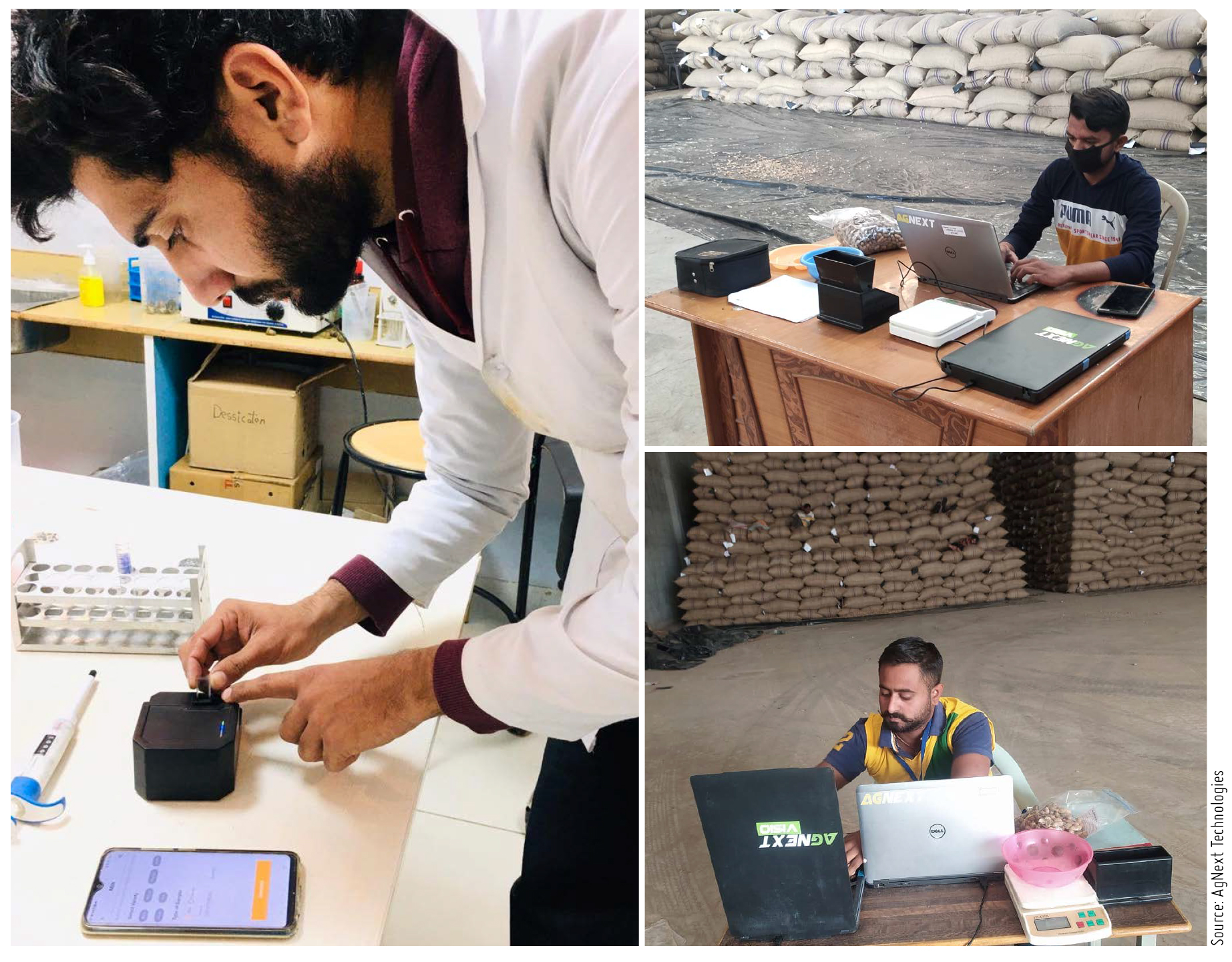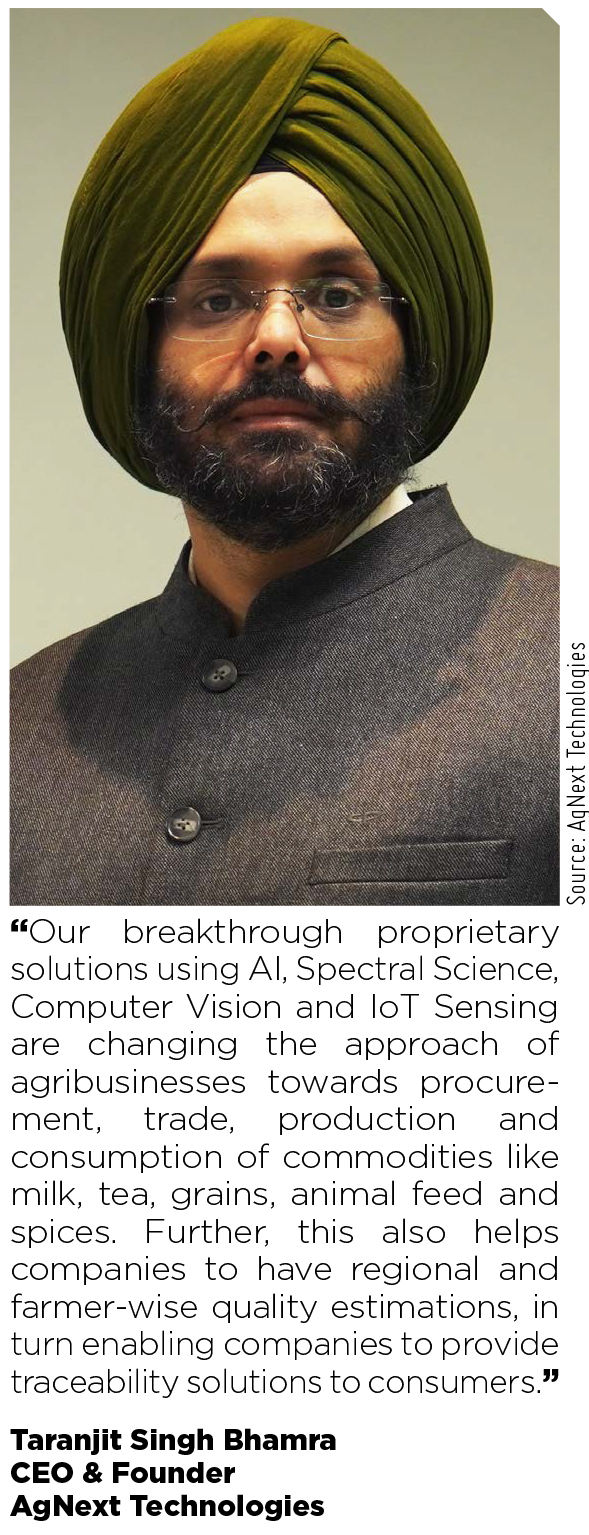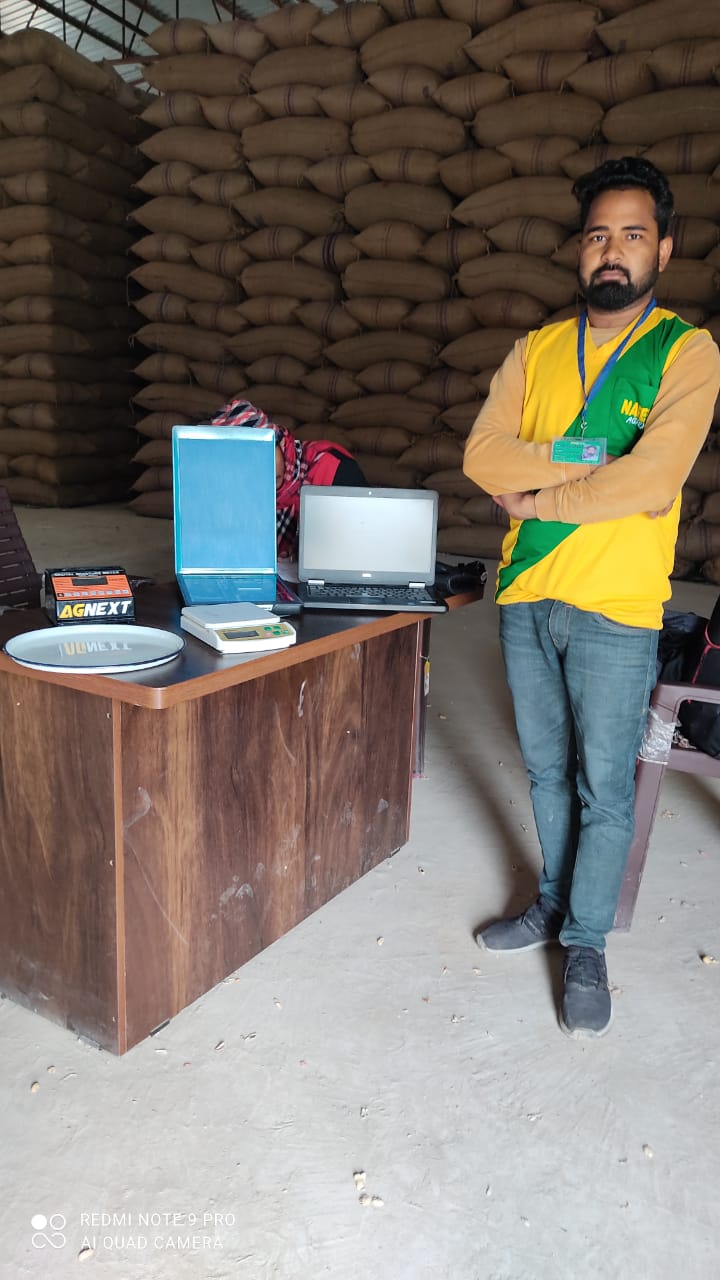Back to the Roots

Leading technology platform for agribusinesses AgNext Technologies strives to solve the problem of food quality to accelerate transactions and build sustainability. Company CEO & Founder Taranjeet Singh Bhamra shares the gaps in the market that prompted him to foray into the agricultural space and transform it like never before…
Taranjit Singh Bhamra, CEO & Founder, AgNext Technologies, was passionate about agriculture right from his childhood days. This passion manifested in the form of Agriculture Engineering from India’s top Engineering University - IIT Kharagpur that offered him exposure to numerous cases where data driven technologies were used in agriculture, for example, Crop Simulation. However, applications were incremental and needed revolutionary transformations for practical applications in agriculture.
His dissertation on Crop Nutrient Modeling and early work on molecular analysis in food, way back in 2001-2002, convinced him that data, ingested through various revolutionary technologies, will emerge as the game changer for agriculture. It is the ingestion of data that morphed into a revolution called AgNext many years later, after his stints globally. The eye-opener
The eye-opener
For three years, post IIT Kharagpur, he had first-hand experience of the challenges at the grassroots level in agriculture, wherein he was associated with food manufacturing operations and commodity procurements and followed it up with an MBA from IIM Calcutta.
While he was working as a project manager for a food manufacturing company in early 2004, he visited the local mandi in Shahjahanpur, Uttar Pradesh. What he saw there changed him immeasurably.
“I saw a farmer and his young son come to sell their produce on a bullock cart. I remember seeing the arhitiya (middleman) pushing them away saying their produce lacks quality after barely looking at it. For the next six days, the father and son stood in the sun and rain waiting for the arhtiya to buy their produce. They eventually had to sell it to him at a fraction of the cost. Seeing the middleman break them in this manner hit me hard because no technology existed to accurately ascertain the value of their produce and a family’s livelihood was being determined on very dubious grounds. But I did not have any money or influence at the time to help them,” shares Bhamra.
Addressing the issues
By the end of 2016, AgNext Technologies got founded in Chandigarh and the startup was also incubated at IIT-Kharagpur. AgNext has innovated a technology platform for agribusinesses aiming to solve the problem of food quality to accelerate transactions and build sustainability. Its breakthrough proprietary solutions using AI, Spectral Science, Computer Vision, and IoT Sensing are changing the approach of agribusinesses towards procurement, trade, production, and consumption of commodities like milk, tea, grains, animal feed and spices.
In his eyes, the biggest concern in Indian agriculture is the lack of trust in key transactions starting at the procurement stage where produce is assessed on subjective grounds. Over the years, this mode of assessment has become a tool with which traders and middlemen exploit farmers. “Thus, they have no incentive to improve their practice. For food processing businesses, traders, and other allied players in agri-commodities, this is a bigger concern because they are purchasing millions of tonnes from farmers without any proper qualitative assessment. Finally, for consumers, this is obviously a problem because of concerns surrounding adulteration,” points out Bhamra.
AgNext received the Best AgriTech Startup of India award from the Union Agriculture Minister,
Narendra Singh Tomar, during the Outlook Agriculture Conclave & Swaraj Awards 2020.
Such interventions have the highest propensity for absorption of technology in agriculture value chains, and both buyers and sellers alike benefit by imbibing the technology. “With the right technology in place, farmers can obtain accurate prices for their produce and greater incentive to improve their farm practices for better quality crops. For businesses, this technology helps save money and increase profitability because now they know what they are paying for. Finally, for consumers, we ensure quality by accurately ascertaining whether there are adulterants or not,” he explains.
Being at IIT Kharagpur incubation center gave the startup access to a significant talent base in the field of computer vision and molecular analysis, through which the team was able to harness new age devices and artificial intelligence-based methodologies to process data.
Qualix – a game-changing technology
AgNext has been a category innovator, providing a technology platform called 'Qualix' for rapid commodity assessment solutions across procurement, trade, production, storage, and consumption of food and Agri value chains. The Qualix AI engine uses spectrometry, computer vision, and IoT Sensing solutions, delivered through an integrated hardware and software interface for accurate and instant quality analysis. “Our technology has the ability to instantly test trading and safety parameters for grains, oilseeds, tea, spices, coffee, milk and animal feed, particularly at the procurement stage. Further, this also helps companies to have regional and farmer-wise quality estimations, in turn enabling companies to provide traceability solutions to consumers. Also, this enables companies to pay farmers based on fair-trade practices and the right quality of commodity they are bringing in for procurement, increasing transparency in the value chain,” Bhamra explains. AI-Based Spectral Analysis — AgNext has innovated and integrated portable, on-field devices connected with Qualix platform that help in instant spectral analysis of agri commodities in the form of liquids, solids, powders, grains or leaves, pretty much covering the whole spectrum nature offers. “Our technology can instantly analyze the chemical composition of commodities like grains, oilseeds, pulses, milk, spices and animal feed. We are only using the technology created years ago by Sir CV Raman for which he had won the Nobel Prize,” he shares.
AI-Based Spectral Analysis — AgNext has innovated and integrated portable, on-field devices connected with Qualix platform that help in instant spectral analysis of agri commodities in the form of liquids, solids, powders, grains or leaves, pretty much covering the whole spectrum nature offers. “Our technology can instantly analyze the chemical composition of commodities like grains, oilseeds, pulses, milk, spices and animal feed. We are only using the technology created years ago by Sir CV Raman for which he had won the Nobel Prize,” he shares.
The spectrum of food taken by the spectroscopy is like an MRI scan of the body. “Like the MRI scan can analyze the body, our spectroscope can analyze the contents in the food in just 30 seconds. By contents, it means the amount of carbohydrates, fat, protein, etc. Similarly, it can also detect adulteration. For example, if there is urea or detergent in milk, our technology can detect it in 30 seconds,” adds Bhamra.
AI-Based Image Analytics — The startup has built a technology which works with on-premise embedded cameras for instant quality assessment using computer vision. Across India, majority of crops are assessed manually and with the naked eye, leaving room for multiple inconsistencies, manual fatigue and manipulations leading to losses across agriculture value chains. “For example, the quality of tea leaves is done by a person who spreads them on a table and makes a subjective assessment. But what we do is a computer-based analysis by taking a picture of the sample. The software analyzes the sample and based on that, they can fix the price. Similar technologies apply to grains like corn, barley, wheat, rice and others to assess the physical parameters like weevilled, shriveled, broken, clean, damaged etc.,” he explains.
AI-Based Sensor Analytics — “We pioneered the first applications for LoRA WAN-based IoT applications in India, which provide quality estimations in multiple agriculture processes in spatial arrangements, like curing, food storage, warehousing and logistics,” states Bhamra.
For India’s ‘Chai’ industry
Determining Fine Leaf Count (FLC) is imperative to the tea industry. AgNext has deployed TragNext, a platform for rapid and accurate estimation of FLC. Using AI and Image Recognition Software, AgNext can identify leaves from various classes coming from garden harvest as leaves, buds, Banjhi, shoots and the rest. Leaves are first dried and separated using a patented technology and then photographed with a high FPS camera. In the post-processed inverted binarized image, each component is identified and extracted separately using AI, and then the images are processed for FLC as per industry standards. A set of final stats show how many leaf and bud configurations are in every shoot, allowing for a percentage of FLC to be displayed on the device and mobile. All this gets done at a fraction of time, gives access to more sampling for better evaluation and removes subjectivity digitizing the entire procurement and payment process from there on. This technology has been deployed in tea estates of Goodricke, Rossell Tea, CISTA, Bokahola Tea, Tea Board of India and many other leading tea companies.
AgNext has built STQC calibrated sensors for temperature, humidity, gaseous emissions, and other parameters key for various agriculture industries like curing solutions, grain silos, warehouses, food processors and storage services. These provide real-time alerts on control parameters and data analytics for actions to be taken as devised by the research institutions for better management of food quality.
Well-received by industry.
The startup has raised a total of $4.2 million funding till date from Omnivore and Kalaari venture funds to expand its research and build this technological platform. The industry has well accepted this new technology that promises to solve the subjectivity and delay in quality procurement, leading to various value losses across the value chain and to stakeholders. Having clients such as Arya Collateral, NAFED, Goodricke, and Rossell Tea attests to the fact that the feedback from the industry has been extremely positive.
“Quality-based trading requires a lot of technology, so we are providing a unique platform to the world. Physical, chemical, and ambient assaying caters to all industry needs. Till now we have partnered with nodal agencies and industry leaders to build and market this technology like Tea Research Association of India, ITC, SourceTrace and many others and currently, we are working across seven states impacting 1.5 million tonne of procurement through our system,” shares Bhamra with evident pride.
AgNext has created a singular platform called Qualix Technology through which multiple
agri-commodities can be assessed in just 30 seconds.

Poonam Pednekar
Chief Copy Editor
Magic Wand Media Inc
poonam.pednekar@magicwandmedia.in



 Facebook
Facebook.png) Twitter
Twitter Linkedin
Linkedin Subscribe
Subscribe